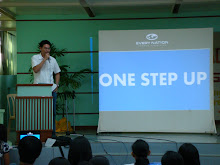I still remember it very clearly in my mind. A couple of months ago , I received an email from someone I did not know. He wrote, “I am a student entrepreneur, and I would like to meet with you.” I emailed my mobile number, and the rest of the events soon became a blur.
Tomorrow, a amazing thing will happen, this driven young man, Neil Huele, who originally emailed me, together with many other young college students from different universities as well as young professionals will get together for the very first STEP UP (Student Entrepreneurship Provides Unlimited Possibilities) Summit. It will be held at the conference hall of the University of the Philippines Campus starting at 8am. Some of the speakers tomorrow are fantastic stories of entrepreneurship, like Philip Tan, founder and CEO of Wellmade, and Bunny Pages of Thirsty, Bright Academy, and Moooon Café fame. Young entrepreneur Charmaine Ong was also instrumental in bridging the assistance of the Jaycees for this event.
I want to share with you an article written by Michael Simmons on the 7 Myths of Student Entrepreneurship, which can motivate more students to consider entrepreneurship as a viable alternative to employment after graduation.
“ 1. I don’t have enough money - Many of America’s largest corporations started on a shoestring budget out of somebody’s garage. A successful Web development company a friend and I started in high school cost only $80 to set up. To compensate for a low budget, you have to be creative, resourceful and make realistic plans.
2. I don’t have enough time - Many of America’s largest corporations were started in people’s spare time. Perfect examples are Hewlett-Packard, Microsoft, and Dell, all of which were started on part-time schedules. All of us have 24 hours in a day. If the business is important to you, you will prioritize it over less important activities and create a business model that fits your schedule. For example, one student at California State University started a business teaching financial skills to high school students during summers. With the money he earned from starting the business, he is putting himself and his brother through school in addition to paying off all of his other expenses.
3. I’m not smart enough - Says who? SATs and grades have very little correlation to people’s potential to be successful entrepreneurs. In fact, "50% of millionaire entrepreneurs never graduated college and 75% of U.S. presidents were in the lower-half club in high school," according to Mathew Lesko in his book, Free Money to Change Your Life. Some examples of businesses started by individuals while still in school are Microsoft, Dell, Napster, Netscape, Fedex, Apple, Tripod, and TheGlobe.com.
4. I’m not creative so I can’t come up with good ideas - There are many books in the library or book store with low-cost business ideas. One specific book of ideas for student entrepreneurs is Generation Inc.: The 100 Best Businesses for Young Entrepreneurs. Or you can find young entrepreneurs at your school or in the media and ask them how they came up with their business idea. Networking with other youth entrepreneurs will also adjust your own mindset to be open to ideas for a business. Also, there are a lot of business ideas already out there that work, that you could replicate or modify slightly.
5. I can’t because the economy is bad - Many of the most successful corporations were started during recessions. During recessions talent is easier and cheaper to find, rent is lower, and there is less competition. All of this adds up to recessions being one of the most opportune times to start a business.
6. I don’t have enough experience - Microsoft, Dell, Kinkos, and Yahoo are just a few of the many successful companies started by people with no business experience. Your experience can certainly affect the success of your company, but you have to start somewhere. If your first business fails financially, then you still will have gained the unique experience, learning, network and growth from running the business that will give you an edge over your peers. I’ve heard many people say they’d rather employ somebody with a failed business than somebody with no experience at all. Companies would rather you fail and learn on your dime than on their dime.
7. I can’t because I’m afraid of failing - According to most statistics, the majority of businesses fail financially after the first few years. In fact, the most successful people in the long-term often have the most failures in their life. So, it is OK to fail. The key is whether you fall forward. You can fall forward in front of your other classmates with the network, experience, and personal growth you got from starting your business. According to Napoleon Hill, a bestselling author who researched the habits of extremely successful people such as Andrew Carnegie, Thomas Edison, and Henry Ford, "Every failure has within it the seeds for equal or greater success." It is your decision whether you plant these seeds.”
Michael Simmons is right. How often is it that we are discouraged because of one of these myths from becoming a young entrepreneur. I want to share a Chinese proverb, “"If you are facing the right direction, all you need to do is keep walking."
, and add to it, “All you have to do is to keep stepping up.” I want to invite students and young people to join us tomorrow and discover ways all of us can step up.
Let’s follow the examples of these ordinary individuals as they strive to make a difference. Each week, lets all get together and share knowledge, stories, experiences, information, all for the sole purpose of getting One Step Up.
For comments, suggestions or stories that you want to share, email me at stirspecialist@gmail.com , or visit www.stirspecialist.blogspot.com






Comments (0)
Post a Comment